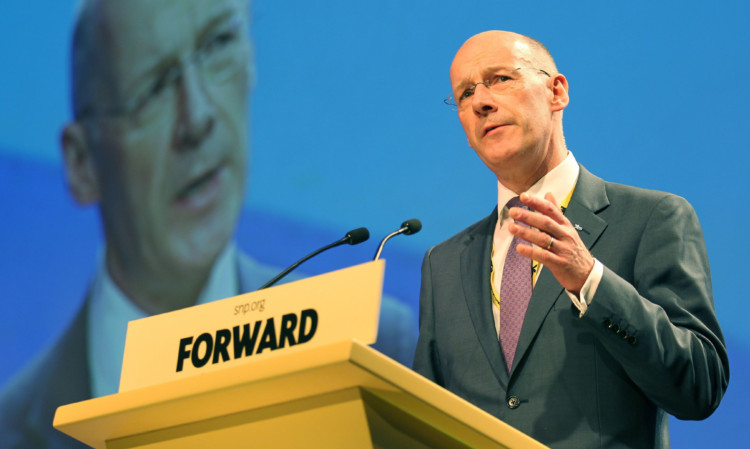
John Swinney knows the arsenal of facts and figures he deploys in his bid for a Yes vote flies over the heads of many Scots.
“It will come down to trust,” predicted the Finance Secretary.
The economy has dominated the referendum campaign, with the credibility of what either side is saying will happen under independence now the key test, rather than the actual content of their messages.
The Yes camp received a boost on the credibility stakes when an unnamed UK Government Minister undermined the pro-Union case by saying there would be a currency deal with an independent Scotland.
Scottish Secretary Alistair Carmichael said the fallout from the story would be over in a week.
No chance.
“It would be no exaggeration to say the last seven days have been the most pivotal moment in the campaign,” claimed Swinney. “What they have demonstrated is the charge we put at the Chancellor that he was bluffing about a currency deal has been vindicated and it has also demonstrated a ‘they will say anything’ assessment of the No campaign.
“If you look at currency zone, we have gone from ‘Logical and desirable’ in the words of Alistair Darling, ‘Something which should not be ruled out’ in the words of Alistair Carmichael, to ‘Highly unlikely’ from Chancellor George Osborne, to ‘It won’t happen’ from the Chancellor and his cohorts and now to ‘It will happen’ from an unnamed Government Minister.
“It demonstrates this crowd will say absolutely anything to persuade people to vote No.”
The accusation “they will say anything” to get what they want has been put at the door of the pro-independence campaign for years, a point acknowledged by the Finance Secretary when he predicts the referendum will ultimately be decided by who the voters trust the most.
“This will come down to trust and I think the people of Scotland will trust themselves and the Government they chose,” he said. “You can relate that to what we have done in Government. People will see how we’ve handled those issues with care and been consistent with the values of people in Scotland.
“At no stage have I advanced a political position that Scotland is unfit to be an independent country but most of my opponents have and are now saying: ‘Of course Scotland could be an independent country’ their credibility is shot.”
I spoke to Swinney just over a year after a leaked Scottish Government paper he wrote voiced concerns about an independent Scotland being able to afford state pensions and unemployment benefits. The paper said the volatility in projecting North Sea oil revenues created financial uncertainty and raised the prospect of public spending cuts to help balance the books. But Swinney, who disappeared from our TV screens in the months after the paper was leaked, insisted it wasn’t a difficult period for him.
“What the document was doing was setting out the types of preparations we have undertaken to make the case for independence,” he said. “We have now advanced these arguments to such an extent that even the most vigorous opponent of independence accept that Scotland has what it takes to be a strong, independent country.”
Asked about any post-Yes vote negotiations, Swinney predicted that things would move fast. He said: “The political landscape will change in an overwhelming fashion. The impetus will be on all parties to make swift and rapid progress on resolving the big questions.”
Despite widespread scepticism, Swinney said the 18-month timetable for negotiations made “clear electoral sense” and “would be a clear and orderly timescale to operate”.
But he conceded: “There will be areas where there will be a longer implementation and transfer period where there would be cooperation with UK Government, on welfare and areas of tax.”
Labour Finance Spokesman, Iain Gray, said: “John Swinney has no shame, given he was caught telling his cabinet colleagues in private that an independent Scotland could not guarantee pensions and would face swingeing cuts to services, while promising the earth in public.”

Enjoy the convenience of having The Sunday Post delivered as a digital ePaper straight to your smartphone, tablet or computer.
Subscribe for only £5.49 a month and enjoy all the benefits of the printed paper as a digital replica.
Subscribe